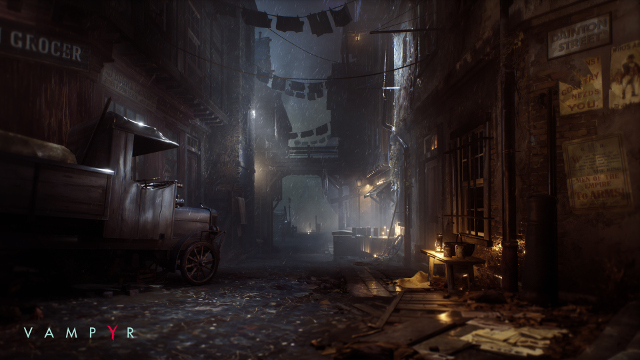These words, spoken by Vampyr’s narrative designer Stephane Beauverger, shifted my perspective on what I had believed was to be Vampyr’s narrative goal. Often, games which offer players a moral choice lean on just that: morality. I am reminded of the original Bioshock’s option to either harvest or “save” the Little Sisters. The reward for harvesting was a huge XP boost; the reward for saving them was a decent night’s sleep and a slightly uplifting ending.
The problem is, games that draw their moral lines in the sand typically offer players only two choices. Two choices that are billed as “tough” to make but end up being decided by whether the player is going for a “good” run or an “evil” run. When I learned that Vampyr was to do the same thing, incentivizing the “dark” path with huge XP gains and punishing players who resisted, I was dismayed. What, then, would the team at Dontnod do to make their player choices meaningful and continue to live up to their studio’s mission statement?
Turns out, I was looking at it all wrong.
Jonathan Reid is a vampire. There’s no helping that. While the narrative arc involves Mr. Reid looking for a cure, it is all but too late for him. Learning about the sixty some odd citizens you can feed on in the game is not about resisting the urge to feed. It’s about which one will benefit you the most while getting away with it. Gaining their trust is crucial, as per vampire lore one cannot enter a home without an invitation. Citizens who discover your true colors may turn on you, becoming an additional obstacle in your way. This is not a game about “the right thing to do.” While the developers were quick to point out that it is possible to complete the game without hurting a single citizen, they also stressed that it would be missing the point. Jonathan Reid is not a hero; he is a monster.
It is still too early to speak about Vampyr’s gameplay. Everything I saw was hands-off with the added “early development.” They explained a little more about how their early twentieth century London was divided into districts. These districts can collapse if too many citizens are afflicted by the Spanish flu or your never-quenched thirst for blood. Losing these districts means losing the opportunity to gain new powers. The map overall is small, but packed with tiny details and places to explore. Some of us were shown a snippet of combat that, while fast, also benefited from the “early in development” disclaimer.

With the success of Life is Strange, there seems to be a lot of unspoken pressure on the team to deliver another home-run narrative (though it should be noted that the Dontnod team working on Vampyr is not the same team that worked on Life Is Strange. That team is working on something super top secret). Too many games try to sell “meaningful” choices as a back of the box bullet point but are hindered by their lack of sacrifice. It was all too easy to make a decision in Mass Effect 2, for example, when the game highlighted important choices in blue and red. Telltale Games like the Walking Dead fare slightly better, putting difficult decisions in the hands of the player and using their familiarity of characters against them.
“Meaningful” is not to be confused with “moral” in Vampyr. Getting to know the citizens is secondary to what can be gained from them, whether it is knowledge or blood. Jonathan Reid, whatever he was, is no longer a good man. Who he will kill is not a matter of if, but when. And it is knowing that distinction that makes Vampyr a game to look forward to later this year.







